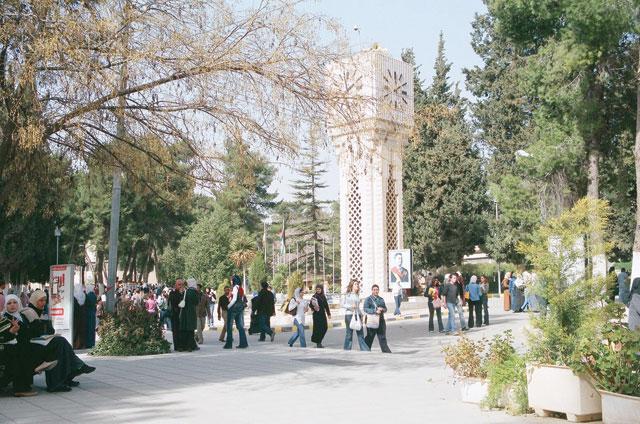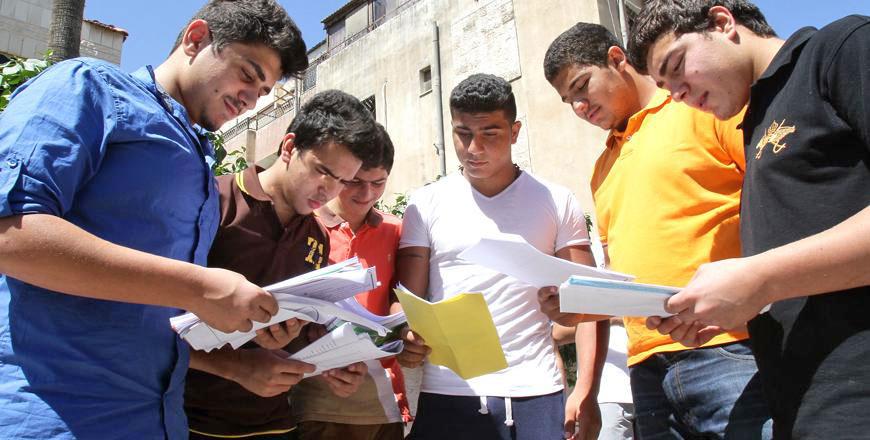You are here
Activists cry foul as public university admission policy deemed unfair
By Dana Al Emam - Sep 10,2014 - Last updated at Sep 10,2014

AMMAN — The "unprecedented" increase in admission in the parallel programme in public universities for the upcoming academic year has serious negative consequences on the outcomes of higher education, experts said.
According to figures of the National Campaign for Defending Students’ Rights (Thabahtoona), the percentage of students admitted to the parallel and international programmes at the University of Jordan (UJ) for the upcoming academic semester reached 60 per cent of the total number of students admitted in the first year, while the percentage at the Jordan University of Science and Technology (JUST) reached 70 per cent.
These numbers have an adverse effect on the quality of higher education, said Thabahtoona Coordinator Fakher Daas, who added that UJ admitted students with grades below the minimum admission average in the parallel programme.
"UJ admitted students with an average of 65.3 per cent to the general administration programme, to which the minimum admission average is 78 per cent," he told The Jordan Times in a phone interview on Wednesday.
According to a statement by the campaign, UJ has allocated only 3,433 seats for regular admission, compared to an annual average of 8,000, while JUST, which admits annually around 5,500 students, allocated around 1,600 seats for regular admission in order to expand enrolment in the parallel programme, under which students pay double the regular tuition fees and thus secure universities with an additional source of income.
The activist warned against the "unprecedented” admission of students with low averages in a bid to address budget deficits, as this would lead to a poorer quality of graduates and damage the reputation of Jordanian universities locally and regionally.
He noted that funding public universities is a "basic and integral" part of the government's duties, urging public universities to make use of their investment funds.
Academic Adel Tweissi, a former president of several public universities, said the increase in the admission for the parallel programme creates a discrepancy in the academic levels of students in the classroom, which largely affects the outcomes of the education process.
“Instructors face an issue in selecting suitable material for all levels, and usually tend to tone down the level of the material, which means that outstanding students will not receive suitable and adequate education,” he said, adding that the entire situation would automatically lead to social problems.
He described the universities’ “trend” of taking the easiest way out to tackle their budget deficit through a bloated parallel programme as “improper”.
Tweissi suggested that universities, especially those in major cities, should develop further investment projects to increase their revenues, urging the private sector to invest in funding scientific research at universities.
“A single patent can create a great income for any university, but when you come to ask professors why they do not pursue patents, they say their universities lack the suitable environment, and the necessary equipment and laboratories,” he told The Jordan Times.
He noted that a pharmaceutical company in the United States could pay $450 million for a university to conduct research to improve a certain medication, adding that the research might not even lead to the expected results.
Tweissi added that public universities bear a social responsibility in providing education and job opportunities for citizens, but their performance in that regard has deteriorated over the past two decades due to financial shortfall.
In an article published on September 9, Al Ghad columnist Mohammad Abu Rumman said Thabahtoona figures reiterate that actual education reform “has not started yet”, adding that the admission policy entails a blatant violation of the principles of equal opportunity and fair competition.
He called for a reassessment of some financial decisions of the administrations of public universities, urging the government to place education among its priorities.
Minister of Higher Education Amin Mahmoud and UJ President Khleif Tarawneh were not available for comment.
A total of 24,451 students were accepted at public universities for the 2014-15 academic year, while the Higher Education Council decided to admit more than 31,000 students to make room for foreign students and exceptional categories.
Related Articles
AMMAN — The National Campaign for Defending Students’ Rights (Thabahtoona) on Monday called for the revision of educational policies concern
AMMAN — The National Campaign for Defending Students’ Rights (Thabahtoona), warned of major price hikes in unified admission fees upon the g
AMMAN — The Higher Education Council (HEC) on Sunday decided to freeze a decision it adopted last month to raise the minimum admission rates












